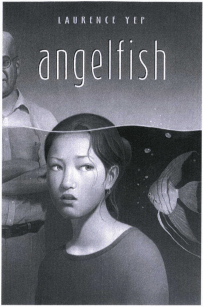
Angelfish by Laurence Yep; G. P. Putnam's
Sons: New York, 2001; $16.99
When I first read Angelfish, I had many reactions to it, but as I progressed through the book, many of the reactions shifted to reveal different ones. At first, when I first met Robin, the main character in this book, I pitied her because she had to work for a racist old grouch and she could not tell anyone, or else her dream role in her ballet class that she had worked so hard to win would be at stake. As I read through the book, I realized that my feelings changed from pity to a strange sort of jealousy and envy. By going to the fish store every day to work off her debt on the broken glass window, she was not only gaining knowledge of fish and being taught tai chi, but she was also learning many very important lessons of life.
Like Robin, I am also Chinese American. Although both my parents are Chinese, I look more Korean than Chinese. Mr. Cao had called Robin a "half person" because she was only half Chinese. People have also often criticized me about my looks. One thing that was different, though, was that they claimed that I was a nobody, for I didn't look a bit Chinese. That hurt me even more than what Robin experienced because I had been born and lived in China for half my life, and I had the heritage and knew about China even more than she did. I think the part where Robin compares the characteristics of the beast in the ballet Beauty and the Beast with Mr. Cao, a grouchy old man who possessed Beast's temper, was especially wonderful, for in the process of comparing the two, she learned both how to help Mr. Cao overcome his fear and how to act as Beauty on the stage. When Robin found out that Mr. Cao was actually a ballet dancer who was also a victim of the Chinese Cultural Revolution, I finally began to understand why Mr. Cao was so gruff in his manner with Robin, and how he tried to cover up everything nice he did with an insult. Although Mr. Cao's intentions were to try to teach and warn Robin of the dangers of an audience so that she would never have to go through what he had to go through, in the end both sides learned a lesson. Mr. Cao learned that no matter what happens, the dance never leaves the dancer, no matter if it is in the mind or the body, and Robin learned not to misjudge people by their appearances, for even a beast would appreciate beauty and magnificence if presented the right way. This part of the story affected me deeply, for my mother's generation and my grandmother's generation were affected immensely by the Cultural Revolution.
Angelfish is a wonderful story for anyone or any age. It will captivate readers and guide them through China's horrific past, from a period of time where even simple dreams seemed impossible, to the present, where a young, innocent girl teaches an old man that no matter when or where, beauty is always appreciated.

Las Vegas, Nevada

